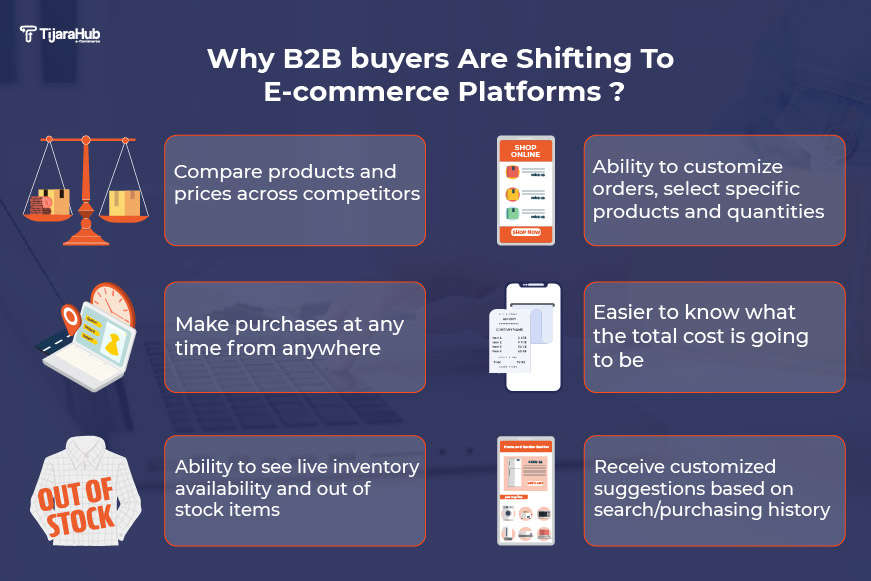Tijarahub International LLC. Copyright © 2024.
TijaraHub International LLC, limited company registered in Sharjah Media City Free Zone under License Number 2323378.01, Tax Number 104118980200001.

Old-fashioned approaches to B2B sales models are no longer effective in the modern market. Buyers are more informed and demanding than ever before, and they expect more from their suppliers. Traditional sales models, which often rely on product features and price discounts, are no longer enough to win business. In reality, buyers often take a more nonlinear path to purchase and may engage with sales reps at different points in their journey. The future of B2B sales is expected to be hybrid, with a focus on combining in-person interactions, remote contact, and e-commerce self-service.
E-commerce is now the number one buying method in the B2B world. According to McKinsey, 65% of B2B companies fully transact digitally today. With decision journeys increasingly unfolding across search, social media, and educational sites, effective promotion means meeting audiences wherever they spend time online.
The conventional B2B sales model, defined by cold calls, extensive RFP processes, and isolated interactions, is undergoing a profound transformation driven by several pivotal factors:
Empowered Buyers: Modern B2B buyers are more knowledgeable and self-reliant than ever. They conduct thorough online research, compare options independently, and depend less on salespeople for information. This shift in power demands a transition from aggressive tactics to value-focused engagement and trust-building.
Digital Transformation: The digital era has revolutionized business operations and interactions. B2B buyers now expect a seamless online experience with accessible product information, self-service options, and convenient communication channels. Online marketplaces offering round-the-clock accessibility and advanced analytics providing deeper insights into buyer preferences compel businesses to adapt their sales strategies to utilize these digital tools effectively. Traditional models based on phone calls and in-person meetings lack the necessary digital infrastructure to meet these evolving expectations.
Competitive Landscape: The B2B marketplace is becoming more competitive, with both global players and new entrants vying for market share. To stand out, businesses need innovative approaches that emphasize agility, differentiation, and a customer-centric focus. Cultivating a culture of innovation and adaptability enables companies to stay agile and resilient in uncertain environments.
Changing Buying Habits: B2B purchasing journeys are increasingly complex and non-linear. Buyers interact with multiple touchpoints across departments and involve various stakeholders. Traditional models that rely on linear interactions with single decision-makers are inadequate for this evolving dynamic.
Demand for Personalization: In an era of mass customization and hyper-personalization, B2B buyers expect solutions tailored to their specific needs and objectives. Traditional sales models, which often adopt a one-size-fits-all approach, fail to meet this demand. Consequently, businesses are shifting towards more agile, customer-centric strategies that leverage data analytics and predictive modeling to anticipate buyer needs and deliver personalized solutions.
Emphasis on Relationship Building: While traditional B2B sales models focus on closing transactions, modern sales approaches prioritize long-term relationship building and customer success. Businesses now recognize the importance of fostering trust, transparency, and collaboration with clients, viewing them as partners rather than mere revenue sources. By adopting a consultative selling approach and emphasizing long-term value creation over short-term gains, companies can build stronger, more resilient partnerships that drive sustainable growth.
Key Disadvantages of Traditional B2B Sales Models
By recognizing these trends and adopting new sales approaches that emphasize customer-centricity, innovation, and flexibility, B2B businesses can position themselves for success in today's competitive marketplace.
With the growing global challenges like the cost of shipping, US-China tensions, and the global supply chain crisis; TijaraHub stands as a good sourcing alternative for Middle East buyers.
- Optimized Supply Chain: By partnering with vendors who prioritize sustainability standards, we streamline logistics processes, reducing waste and inefficiencies throughout the supply chain.
- Smart Packaging Solutions: Encouraging our vendors to Implement innovative packaging solutions that are both eco-friendly and cost-effective, minimizing packaging materials while ensuring product safety and integrity.
TijaraHub has full-function teams in Egypt and Turkey that are strategically positioned to offer Dual-Sided comprehensive support for both buyers and suppliers through the whole order cycle, ensuring seamless operations and customer satisfaction.
TijaraHub have established extensive partnership networks in Egypt and Turkey with TPOs (Trade Promotion Organizations), leveraging these connections to unlock new opportunities and drive growth for our clients.